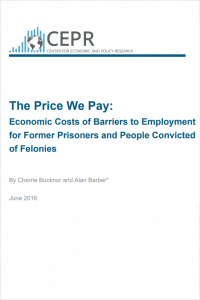The Price We Pay: Economic Costs of Barriers to Employment for Former Prisoners and People Convicted of Felonies
Center for Economic and Policy Research
The report discusses that, despite modest declines in recent years, the large and decades-long blossoming of the prison population ensure that it will take many years before the United States sees a corresponding decrease in the number of former prisoners. Using data from the Bureau of Justice Statistics (BJS), this report estimates that there were between 14 and 15.8 million working-age people with felony convictions in 2014, of whom between 6.1 and 6.9 million were former prisoners.
Prior research has shown the adverse impact that time in prison or a felony conviction can have on a person’s employment prospects. According to the report's authors, in addition to the stigma attached to a criminal record, these impacts can include the erosion of basic job skills, disruption of formal education, and the loss of social networks that can improve job-finding prospects. Those with felony convictions also face legal restrictions that lock them out of many government jobs and licensed professions.
Assuming a mid-range 12% employment penalty for this population, this report finds that there was a 0.9–1.0% reduction in the overall employment rate in 2014, equivalent to the loss of 1.7 to 1.9 million workers. In terms of the cost to the economy as a whole, this suggests a loss of about $78 to $87 billion in annual gross domestic product (GDP).
